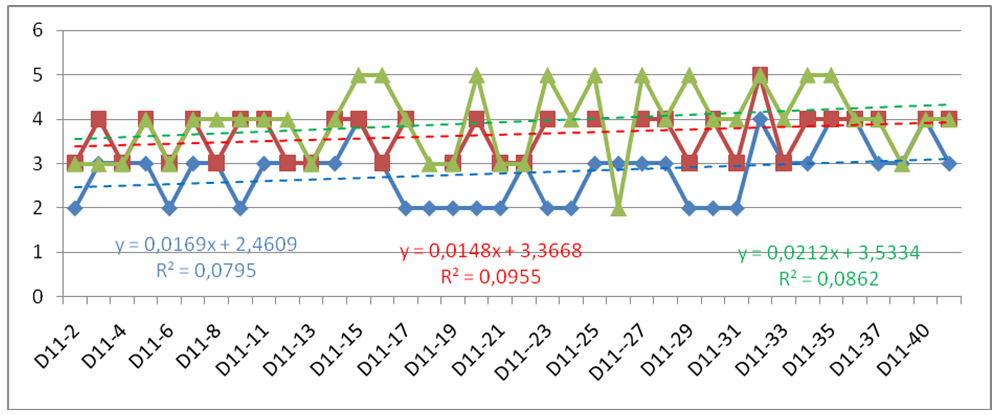Evaluación del aprendizaje en las clases prácticas de atletismo
Contenido principal del artículo
Resumen
Durante la implementación del plan de estudio E de la formación del profesional en la carrera de Cultura física se necesita transformar el paradigma evaluativo tradicional en las clases prácticas de la asignatura Atletismo. El objetivo fue estudiar la tendencia evolutiva de los resultados de la evaluación técnica en las carreras planas de velocidad. Se realizó un estudio transversal de la variable aprendizaje mediante un diseño pre-experimental. Los resultados alcanzados por el grupo estudiado mostraron un predominio de la tendencia incremental en cuanto a la calidad de la ejecución técnica de la carrera de velocidad. Se concluye que la tendencia evolutiva de los resultados del aprendizaje a partir de la aplicación del procedimiento de evaluación formativa demostró una tendencia al incremento cualitativo de los resultados en el desempeño técnico de la muestra estudiada.
Descargas
Detalles del artículo

Esta obra está bajo licencia internacional Creative Commons Reconocimiento-NoComercial 4.0.
Aquellos autores/as que tengan publicaciones con esta revista, aceptan los términos siguientes:
- Los autores/as conservarán sus derechos de autor y garantizarán a la revista el derecho de primera publicación de su obra, el cuál estará simultáneamente sujeto a la Licencia de reconocimiento de Creative Commons 4.0 Reconocimiento-NoComercial que permite a terceros compartir la obra siempre que se indique su autor y su primera publicación esta revista. Bajo esta licencia el autor será libre de:
- Compartir — copiar y redistribuir el material en cualquier medio o formato
- Adaptar — remezclar, transformar y crear a partir del material
- El licenciador no puede revocar estas libertades mientras cumpla con los términos de la licencia
Bajo las siguientes condiciones:
- Reconocimiento — Debe reconocer adecuadamente la autoría, proporcionar un enlace a la licencia e indicar si se han realizado cambios. Puede hacerlo de cualquier manera razonable, pero no de una manera que sugiera que tiene el apoyo del licenciador o lo recibe por el uso que hace.
- NoComercial — No puede utilizar el material para una finalidad comercial.
- No hay restricciones adicionales — No puede aplicar términos legales o medidas tecnológicas que legalmente restrinjan realizar aquello que la licencia permite.
- Los autores/as podrán adoptar otros acuerdos de licencia no exclusiva de distribución de la versión de la obra publicada (p. ej.: depositarla en un archivo telemático institucional o publicarla en un volumen monográfico) siempre que se indique la publicación inicial en esta revista.
- Se permite y recomienda a los autores/as difundir su obra a través de Internet (p. ej.: en archivos telemáticos institucionales o en su página web) antes y durante el proceso de envío, lo cual puede producir intercambios interesantes y aumentar las citas de la obra publicada. (Véase El efecto del acceso abierto).
La revista no se responsabiliza con las opiniones y conceptos emitidos en los trabajos, son de exclusiva responsabilidad de los autores. El Editor, con la asistencia del Comité de Editorial, se reserva el derecho de sugerir o solicitar modificaciones aconsejables o necesarias. La mención de marcas comerciales de equipos, instrumentos o materiales específicos obedece a propósitos de identificación, no existiendo ningún compromiso promocional con relación a los mismos, ni por los autores ni por el editor.
Citas
Alonzo, A. (2018). An Argument for Formative Assessment with Science Learning Progressions.Applied Measurement in Education, 31(2), pp.104-112. https://doi.org/10.1080/08957347.2017.1408630
Bakhtiar, A., Webster, E. A. y Hadwin, A. F. (2018). Regulation and Socio-Emotional Interactions in a Positive and a Negative Group Climate.Metacognition and Learning, 13 (1), 57-90. https://doi.org/10.1007/s11409-017-9178-X
Delgado, V., Hortigüela Alcalá, D., Ausín, V. y Abella, V. (2018). El Blog como Instrumento de Mejora para la Autorregulación del Aprendizaje del Estudiante Universitario. Estudios Pedagógicos, 44(2), pp.171-184.
González, M. (2000). La evaluación del aprendizaje en la enseñanza universitaria. Universidad de La Habana-CEPES: Revista Pedagogía Universitaria, Vol 5 No. 2, pp.16.
González, M. (2002). La evaluación del aprendizaje. En: La evaluación del aprendizaje en la educación superior. CEPES
González, M. (2017). Una evaluación al servicio del conocimiento y del aprendizaje. Tiching, S.L. http://blog.tiching.com/una-evaluacion-al-servicio-del-conocimiento-y-del-aprendizaje/
Gutiérrez, C., Hortigüela Alcalá, D., Peral, Z. y Pérez-Pueyo, A. (2018). Percepciones de Alumnos del Grado en Maestro en Educación Primaria con Mención en Educación Física sobre la Adquisición de Competencias. EstudiosPedagógicos,44(2), pp.223-239.
Lago, V. (2022). Sistema de evaluación formativa para la mejora del rendimiento académico en el curso preparatorio de la Escuela Latinoamericana de Medicina.[Tesis Doctoral]. CEPES
Mola, M. (2019). Estrategia didáctica para la evaluación formativa en la disciplina teoría y práctica de la educación física. [Tesis Doctoral]. Universidad de Ciencias de la Cultura Física y el Deporte, Manuel Fajardo.
Morales, P. (2009). La evaluación formativa. Universidad Pontificia Comillas. Facultad de Ciencias Humanas y Sociales, Madrid. http://www.upcomillas.es/personal/peter/otrosdocumentos/Evaluacion formativa.pdf
Romero, E. (2009). Programa de Atletismo Básico. Plan de estudios D de la Licenciatura en Cultura Física. Universidad de Ciencias de la Cultura Física y el Deporte, Manuel Fajardo.

